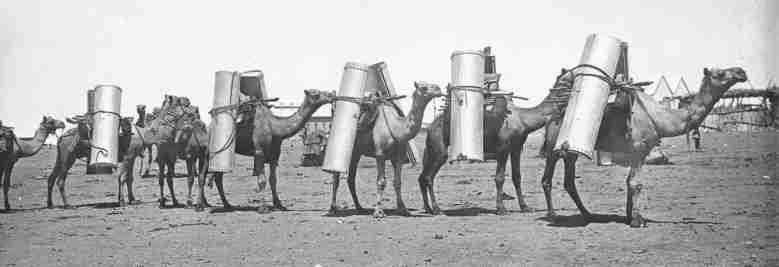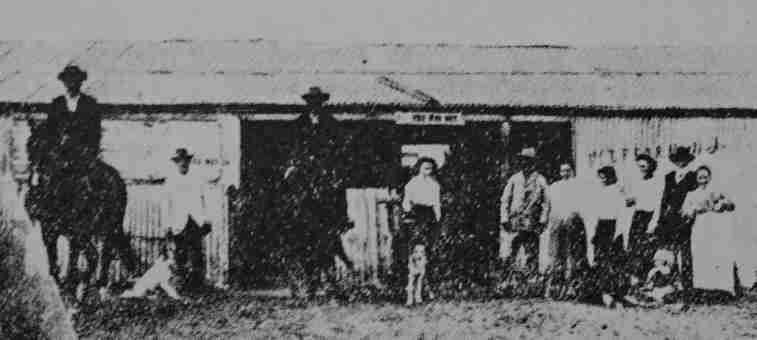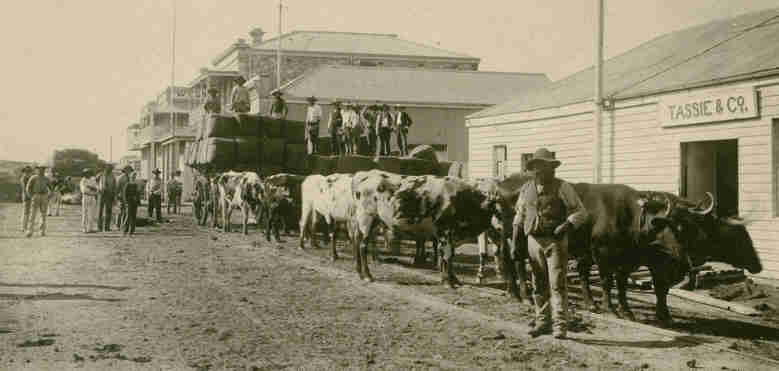


|
Gibson's Camp
Part 3
|
Later that year when Charles Gunter was mine host and member of the Licenced Victuallers Association, a program of races for Christmas was put up. The idea was good but very few spectators turned up due the extremely dry season. Even so, an excellent program was provided by the Stewards with the assistance of Gunter. One of the spectators who turned up was a reporter for the Port Augusta newspaper and he wrote about it as follows. Gibson's Camp is a watering place for Her Britannic Majesty's mail, and a quiet resort for Bacchanalian bushmen, where ample accommodation can be obtained for man and beast; it never before was so prominently brought before the public as lately by its spirited proprietor Mr Charles Gunter who pluckily intimated the Gibson's Camp Races. The invitation was responded to as well as could be expected, under the trying circumstances of heat and distance; although some keen disappointment was felt that some of the Port Augusta cracks were conspicuous by their absence. Seven horses faced the music and many of the knowing ones ventilated their remarks as each took his fancy of the Centaur who was to mount the crack. The course which is a heavy one was about six furlongs long and great pains and trouble was spent on making it. The grand stand was draped with bunting and afforded a commanding view of the whole position The first race on the program was the Hurdles, followed by the Gibson's Camp Handicap of one mile. The event of the day, was well contested since the horses had to run twice round the course. The Gason Memorial of five furlong was the last of the day. Later on, refreshments were again available and the jovial crowd adjourned to the well-furnished apartment to imbibe the convivial glass and enlivened with song and jest.
The happy possessors of binoculars having the advantage of the range, and despite the heat at 101 degrees in the shade the meeting was well attended and the greatest harmony and good feeling prevailed the whole time. At 12.30 p.m. the tinkling of the bell announced that the Christmas dinner was ready to be partaken of. The inside arrangements were tastefully decorated by the gentle touch of the entertaining and pleasant hostess. The dinner was a decided success, the table fairly groaned with delicious viands and tempting morsels, and the unanimous and pronounced remarks of all who partook of it was that it was decidedly good and beyond what was expected. Great credit was due to the obliging house keeper, who though but recently recovering from a severe illness has done her best to make things as comfortable and pleasant as possible. The liquids were well sampled and flowed ad lib. But, unfortunately the champagne at a guinea a bottle was not within the reach of all, and remained in the cork and was consigned to the bin to await the advent of more copious rains or the influx of larger cheques. After a sufficient interval to allow of digestion and give the "Joker" a chance, McKellar, Sherry, Edward and Briscoe acted as stewards for the occasion and even a greenhorn like myself could not venture a doubt that they were tyros at the business, but were not only thoroughly conversant and familiar with the technicalities and intricacies of the game of racing. Mr Harman regaled the company with a few choice songs and though his voice was a trifle husky, yet the Londoner, like a gallant on the crest of the billow, rose to the occasion. Mr Douglas also rendered a solo which was loudly encored, Mr Domyer's excellent rendering of various selections and accompaniments to the songs was also largely appreciated'. The whole affair was a success and it was hoped that the next year would prove greater to the enterprising proprietors who cater for the amusement of the bushmen who have not the advantage of attending the meetings in the townships. There have been many races at the Camp since that first one and every time the program included the Gason Stakes, Gason Cup or Gason Memorial Stakes.
In 1904 Gibson's Camp Hotel was still the only one between Port Augusta and Tarcoola and still managed by Charles Gunter. Traffic was still minimal, a few camel teams and their Afghan drivers transporting wool to Port Augusta or mining equipment and other supplies to Tarcoola. Certainly, far different from the early days when as many as 150 bullock teams could be seen. With fewer people in the neighbourhood the polling booth, which had opened in 1898 was closed for some elections. On 21 September 1905, James Barry died. He had been Returning Officer at the camp ever since it was proclaimed a polling place. Because of the continuing heath the track still caused many problems. On February 1905 the body of Frank Nankervis was found who had perished from want of water. Another body was found on 23 November 1908. This time it was John Webb, a Canadian sailor who had jumped ship in Port Adelaide. After visiting the hotel, he went on his way but got lost and died of thirst. When Charles Gunter applied for the renewal of his licence in 1909, he was warned about that 'blacks' were allowed to congregate on the hotel premises and that meals and liquor, supplied to travellers, was of inferior quality. The charge could not be proven and he was granted his licence but with the warning 'Not to supply the blacks with liquor'.
In November 1910 a sport meeting was organized which passed off successfully with a fair attendance. There were several visitors from nearby stations including South Gap, Yudnapinna and even from Port Augusta. During the night a concert was held with the help of C Finlay, B Morris, G Pike, O and CR Richardson and F Davey. Charles Richardson had been a contractor at the camp since 1880. A few weeks later the Races were on again which included a ladies' race of one mile. It was won by Miss R Finlay with Mrs Pike coming in second. There had been several changes in the ownership of the hotel with CR Richardson and his wife ruling in 1911. Law and order came to the camp when Constable S Day was stationed there in 1912. He stayed for a few years and after service at many other places was appointed Sergeant in 1935. In August 1912 the lease of the water reserve, including the hotel, wells and tank was auctioned at the Land Office in Adelaide at an upset price of 70 pounds. After some hectic bidding it was sold for 89 pounds to NA Richardson, who already was the occupier. On 27 April 1913 Gibson's Camp was in the news again when the headline read 'Gibson's Camp Fashionable Resort for Motorists'. The reason being that apparently three cars had stopped at the hotel in one day. The drivers and passengers may have enjoyed their adventure but the country 'looked wretched for want of rain'. Much better news was the start of surveyors working in the area for the building of the East-West line which, when finished, would pass within 40 yards of the hotel. In May the whole area looked a 'picture of desolation' with both water and feed scarce. Lambs were dying all over the place. Matters did not improve during the winter when there was 'frost, frost, and more frost, but no rain'. Spring was just as bad with several severe storms. During one of these the verandah of the front of the hotel was blown off and landed half a mile away in the bush. It much have been the proverbial straw that broke the camel's back, for NA Richardson as on 9 December 1913 he transferred the publican's licence to Ernest Victor Lethbridge. He soon had a very busy day when the Governor of South Australia and its entourage were having lunch at the hotel when inspecting the work in progress on the East-West Railway in January 1914.
Finally there were lots of people in the area with little else to do after work than going to the hotel. Many of them came straight from the city and were not used the either the working conditions or the heath. Naturally there were labour problems and in May JA Robinson, representative of the Australian Workers Union, was at the camp to sort out the members' grievances. That same month two men, Michael Killeen and Robert Finlay of Wallaroo, were killed when they were run over by a train after leaving the hotel. In September the licence changed once again when the new publican was Charles Rankine Richardson, whose only daughter Gladys May, had just been engaged to John L O'Sullivan of Norseman Western Australia. One night in February 1915, Thomas Henry Webster had a good time at the hotel and after a few drinks left with a bottle of whisky and went Walkabout. That was the last anyone saw of him. He was reported missing and Constable Day organized an extensive search. No trace of him has ever been found. In 1916 John Wyall, an elderly bushman suddenly died at the hotel. He had been a mail driver before the railway went through. He was buried at at Gibson's Camp a few yard of the old mail track. Somehow it seemed that the hotel or the camp was not the heathiest place in the Nor'West. For a small place like Gibson's Camp the number of deaths were more than the average. Not only did men die, the camp was dying too. When in 1919 extensive improvements and repairs were required to keep it going as a licensed concern, the owners decided to close the place rather than comply with the orders. By 1923 the place was practically deserted. With the hotel closed, there was no reason anymore to stop at the camp and within a few years only the usual ruins remained.
*** If you would like to find out more,
|






